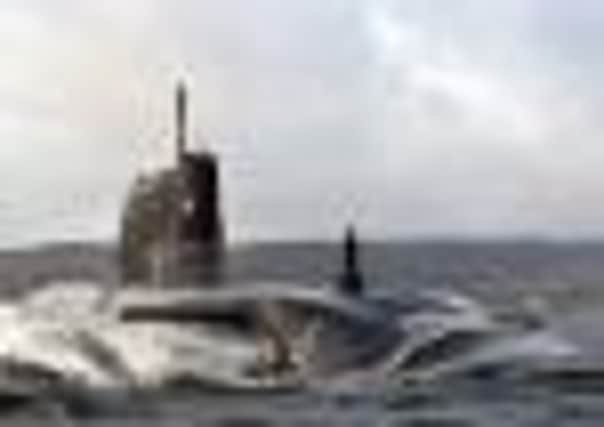Submarine deal ‘will put new WMDs on the Clyde’ says SNP


Defence Secretary Philip Hammond confirmed the decision to sign a contract for the production of reactors for nuclear-powered submarines. These include the Faslane-based Vanguard submarines which carry the UK’s Trident nuclear missiles.
SNP Westminster leader Angus Robertson attacked the decision, which he said would lead to “the next generation of weapons of mass destruction on the Clyde”.
Advertisement
Hide AdAdvertisement
Hide AdThe contract signed with Rolls-Royce will involve a £500 million regeneration of the engineering firm’s Raynesway site.
The remaining £600m will sustain reactor production at the facility until March 2023.
Mr Robertson said: “This announcement paves the way for Trident renewal and it does so in the face of opposition in Scotland.
“The majority of MPs from Scotland, the majority of MSPs, have voted against Trident renewal.
“The Scottish Government is opposed to Trident, the Scottish Trades Union Congress is opposed to Trident, the Church of Scotland is opposed, the Roman Catholic Church in Scotland is opposed, the Episcopal Church in Scotland is opposed, the Muslim Association of Scotland is opposed and the public of Scotland, most importantly, is also overwhelmingly opposed to the renewal of Trident.”
He added: “The Westminster government is aware of these objections but it is ploughing on regardless.
“And then, at the end, it plans to dump this next generation of weapons of mass destruction on the Clyde. This is a democratic affront and it is an obscene waste of money.”
Mr Hammond told MPs during a Commons statement yesterday the reactors would power the Astute-class attack submarines and the replacement for the Trident missile-armed Vanguard class, subject to final approval.
Advertisement
Hide AdAdvertisement
Hide AdHe accused Mr Robertson of “hyperbole” and added that 6,000 jobs depended on the Scottish naval bases.
The SNP has a long-standing opposition to nuclear weapons. The prospect of a Nationalist government holding office in Scotland in the event of independence, after the 2014 referendum, would almost certainly spell an end to the nuclear-armed submarines on the Clyde.
But Mr Hammond said: “We hope after mature consideration, they will see the advantages of remaining within a United Kingdom and enjoying the benefit of the security afforded by the United Kingdom’s nuclear umbrella.
“This investment will secure the jobs of 300 “highly-skilled workers” and will ensure that the UK retains the capability to build submarine nuclear power plants in the UK.
The issue of replacing the submarine-based Trident nuclear deterrent is also controversial within the coalition Government, with Liberal Democrat defence minister Nick Harvey chairing an investigation into possible alternatives.
Spending the money on infrastructure projects would support 10,000 jobs directly and a further 4,900 through indirect purchases, he claimed.
Labour’s shadow defence minister Alison Seabeck said that her party would continue to support the government on defence where it felt ministers were taking the right decisions.
She added: “This is a vital programme a separate Scotland would not be able to afford, or benefit from, in terms of security or jobs if it didn’t go ahead.
Advertisement
Hide AdAdvertisement
Hide Ad“Indeed, development of the reactor needs to go ahead whether or not there is a decision on Trident, because it relates to the UK defence capability and our submarine programme going forward, with huge implications for places like Barrow – and a point completely missed by Mr Robertson.
“It’s very easy to be blinkered by concerns in some quarters over the successor programme and lose sight of the wider need for the research and development and investment required to keep our nation safe.
“Some issues ride above party politics and national security is one of them.”
The ultimate decision on whether to proceed and how many submarines to order won’t be taken until 2016, after the expected date of the next election.
The delivery date for the first submarine has also been put back to 2028, while the number of operational missiles carried will be cut to eight and the number of warheads to 40.
Of the £1.1bn, about £500m is investment in capital infrastructure at the Rolls-Royce plant, Mr Hammond said.
The remaining £600m is going on the purchase of “long-lead” items for the production of the core for the reactor for the seventh Astute-class boat and the first Successor-class boat.
But Labour MP Jeremy Corbyn said: “All you’re doing is building, at a huge level of expenditure, in advance of the decision in 2016, which will leave this country wasting £100bn on a weapon of mass destruction of dubious legality and total immorality.”